Reading Time: 20 minutes
Eating healthy food is essential for your longevity and not everything that is healthy has to be expensive. Although many assume a healthy diet is cost-prohibitive, when in fact it’ll help save money in the long run. With a series of small changes in your diet, your savings on healthcare alone will be well worth making the switch, though your grocery bills will be significantly lower too.
Given below is a list of healthy ingredients you might consider adding to your regular diet. Not only will they save you money and drastically improve your quality of life, but they can also be delicious too!
Here is list of 50 ingredients
- Water
Benefits: Provides essential hydration
 This one is so obvious it might not seem like it needs to be said, but there is simply no way to put enough emphasis on the importance of water for all bodily functions to be carried out on a cellular level. It is recommended to drink at least 1.5 litres of water per day in order to function optimally and feel your best. Dehydration puts you at risk for a whole host of problems, and too much water risks flooding your brain, so sticking well below four liters, unless you’re an Olympic athlete, is probably best.
This one is so obvious it might not seem like it needs to be said, but there is simply no way to put enough emphasis on the importance of water for all bodily functions to be carried out on a cellular level. It is recommended to drink at least 1.5 litres of water per day in order to function optimally and feel your best. Dehydration puts you at risk for a whole host of problems, and too much water risks flooding your brain, so sticking well below four liters, unless you’re an Olympic athlete, is probably best.
- Milk
Benefits: Promotes bone growth
 While not everyone can consume milk due to lactose intolerance or other dietary restrictions, dairy products like cow’s milk can make excellent sources of protein, packing eight grams per serving at a low calorie count. It also has high levels of calcium and other minerals which are difficult to get elsewhere, which makes sense considering it is designed to nourish baby cows and help them grow big and strong. In humans, drinking milk is shown to contribute to healthy bones and teeth.
While not everyone can consume milk due to lactose intolerance or other dietary restrictions, dairy products like cow’s milk can make excellent sources of protein, packing eight grams per serving at a low calorie count. It also has high levels of calcium and other minerals which are difficult to get elsewhere, which makes sense considering it is designed to nourish baby cows and help them grow big and strong. In humans, drinking milk is shown to contribute to healthy bones and teeth.
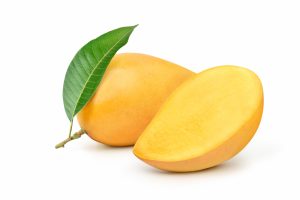
3 Mango: Known as the ‘King of Fruits’, mangoes come in various varieties and are sweet, juicy, and rich in vitamins A and C. They are a summer favourite in India.
- Guava:
 Guavas have a sweet-tangy flavour and are rich in Vitamin C and dietary fibre, aiding digestion and boosting immunity.
Guavas have a sweet-tangy flavour and are rich in Vitamin C and dietary fibre, aiding digestion and boosting immunity.
- Jamun (Black Plum):
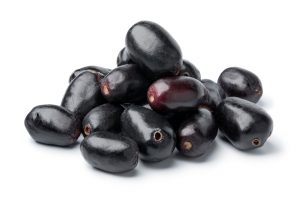 This Indian fruit is low in calories and high in antioxidants, aiding in digestion and diabetes management.
This Indian fruit is low in calories and high in antioxidants, aiding in digestion and diabetes management.
- Avocadoes
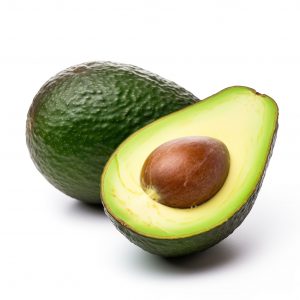 Benefits: High in antioxidants, fiber
Benefits: High in antioxidants, fiber
Avocadoes are high in natural antioxidants, which could lower the oxidative stress present in the body. They are also rich in Vitamin E, which overall helps your skin health. Moreover, the avocado also contains Vitamin B5 which has many benefits such as a decrease in tiredness while boosting cognitive capacities. In fact, if you are feeling low on energy, eat half an avocado with olive oil and lemon and fill up on energy.
- Blackberries
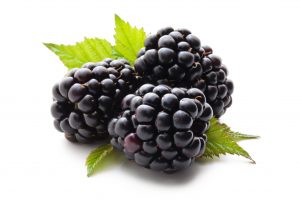 Benefits: Boost your immune system
Benefits: Boost your immune system
Your immune system is the only protection you have between your environment and a whole host of nasty diseases. To protect yourself against them, it is essential to eat blackberries and other antioxidant-rich fruits because they have the ability to help your body defend itself. This tiny-but-mighty berry is also a powerful anti-inflammatory agent. Consuming it regularly can help you fight against the various inflammations that your body may face and more particularly helps cure ailments of the upper respiratory tract.
- Pomegranates
Benefits: Anti-Cholesterol
 The pomegranate is a bright red fruit that looks simple on the outside, but contains hundreds of tiny, edible seeds. Pomegranates are hailed as a superfood because of the many health benefits they hold. With one in five people showing an elevated level of bad cholesterol, it’s important to not become another statistic. Studies have shown that pomegranates help to reduce the level of bad cholesterol in the blood, and are a whole lot cheaper than repeat visits to the doctor, and prescription medication.
The pomegranate is a bright red fruit that looks simple on the outside, but contains hundreds of tiny, edible seeds. Pomegranates are hailed as a superfood because of the many health benefits they hold. With one in five people showing an elevated level of bad cholesterol, it’s important to not become another statistic. Studies have shown that pomegranates help to reduce the level of bad cholesterol in the blood, and are a whole lot cheaper than repeat visits to the doctor, and prescription medication.
- Kiwi
Benefits: Natural anti-ageing effects
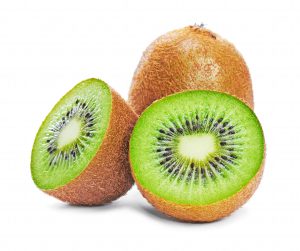 Kiwi fruit has the power to boost our immune system while preventing certain diseases. It is so high in Vitamin C that one is enough to cover 85% of the recommended dietary intake. That’s not all, this delicious fruit is rich in another type of vitamin; Vitamin E which is a natural antioxidant that promotes immune health. Studies have shown that an adequate intake of Vitamin C is associated with a decrease in the severity of symptoms of several conditions, including osteoarthritis, rheumatoid arthritis, and asthma. So don’t wait any longer to make yourself a colourful, crunchy kiwi salad.
Kiwi fruit has the power to boost our immune system while preventing certain diseases. It is so high in Vitamin C that one is enough to cover 85% of the recommended dietary intake. That’s not all, this delicious fruit is rich in another type of vitamin; Vitamin E which is a natural antioxidant that promotes immune health. Studies have shown that an adequate intake of Vitamin C is associated with a decrease in the severity of symptoms of several conditions, including osteoarthritis, rheumatoid arthritis, and asthma. So don’t wait any longer to make yourself a colourful, crunchy kiwi salad.
- Passion Fruit
Benefits: Rich in vitamins
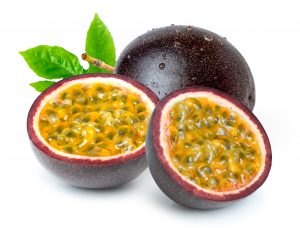 Passion Fruit, with its tantalising flavour, offers a delectable way to boost your health. This tropical gem boasts a nutritional profile that’s nothing short of impressive. Packed with essential vitamins like C, A, and B, it not only enhances your immune system but also promotes healthy skin, vision, and metabolism. Its high biotin and folic acid content supports vibrant hair and overall well-being. Additionally, passionfruit provides a mineral-rich bounty, including potassium for heart health, calcium for strong bones, magnesium for muscle function, and zinc for immune support. Whether savored as a snack or blended into a smoothie, passion fruit is a tasty path to wellness.
Passion Fruit, with its tantalising flavour, offers a delectable way to boost your health. This tropical gem boasts a nutritional profile that’s nothing short of impressive. Packed with essential vitamins like C, A, and B, it not only enhances your immune system but also promotes healthy skin, vision, and metabolism. Its high biotin and folic acid content supports vibrant hair and overall well-being. Additionally, passionfruit provides a mineral-rich bounty, including potassium for heart health, calcium for strong bones, magnesium for muscle function, and zinc for immune support. Whether savored as a snack or blended into a smoothie, passion fruit is a tasty path to wellness.
- Watermelon
Benefits: Rich in antioxidants
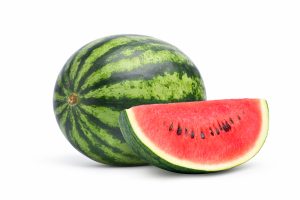 Watermelon contains about 90% water, which makes it useful for staying hydrated in the summer. It can also satisfy a sweet tooth with its natural sugars. Watermelon also contains high levels of antioxidants, which help eliminate free radicals from the body. Free radicals enter your body through exposure to air and water pollution or in highly processed foods. Eating foods like watermelon that counteract the harmful effects of these free radicals will no doubt save you time and money out of the doctor’s office.
Watermelon contains about 90% water, which makes it useful for staying hydrated in the summer. It can also satisfy a sweet tooth with its natural sugars. Watermelon also contains high levels of antioxidants, which help eliminate free radicals from the body. Free radicals enter your body through exposure to air and water pollution or in highly processed foods. Eating foods like watermelon that counteract the harmful effects of these free radicals will no doubt save you time and money out of the doctor’s office.
- Prunes
Benefits: Good for your bowels
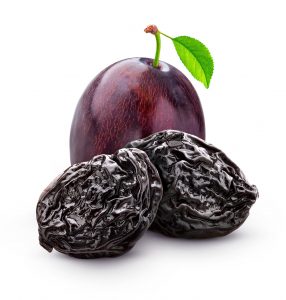
It might be well known by now, as prunes are often the butt of the joke considering their useful bathroom applications, but they have become a pantry staple for a reason. With high levels of fibre and magnesium, they help fight constipation naturally. So instead of reaching for expensive laxatives or stool softeners that can have strong, unintended side effects, instead opt for the tried-and-true standby that grandmothers have been recommending for generations.
- Orange
Benefits: High Vitamin C content
 Like other citrus fruits–grapefruits, lemons, and tangerines–oranges have an abundant source of Vitamin C. They also contain polyphenols and terpenes, the main molecules of citrus fruits, which both have the capacity to block the growth of tumors and to potentiate the anti-cancer properties of other fruits and vegetables, increasing their concentration in the blood. While they are high in natural sugars, they make an excellent dessert or healthy snack when you’re feeling low in blood sugar, as their fructose is easily absorbed by the body. If you feel a cold coming on, it’s a smart idea to reach for an orange instead of one of those expensive, heavily-marketed Vitamin C cocktails.
Like other citrus fruits–grapefruits, lemons, and tangerines–oranges have an abundant source of Vitamin C. They also contain polyphenols and terpenes, the main molecules of citrus fruits, which both have the capacity to block the growth of tumors and to potentiate the anti-cancer properties of other fruits and vegetables, increasing their concentration in the blood. While they are high in natural sugars, they make an excellent dessert or healthy snack when you’re feeling low in blood sugar, as their fructose is easily absorbed by the body. If you feel a cold coming on, it’s a smart idea to reach for an orange instead of one of those expensive, heavily-marketed Vitamin C cocktails.
- Raspberry
Benefits: Anti-carcinogenic properties
 Along with other members of the berry family, raspberries are considered one of the healthiest fruits in the produce aisle. Boasting powerful anti-cancer properties, raspberries are rich in polyphenols much like their cousin’s blackberries and blueberries. Eaten by the handful or tossed on top of yogurt or cereal, raspberries make a great addition to any diet. They’re also lower in sugar than other fruits, so they won’t cause an energy spike that leads to an inevitable crash.
Along with other members of the berry family, raspberries are considered one of the healthiest fruits in the produce aisle. Boasting powerful anti-cancer properties, raspberries are rich in polyphenols much like their cousin’s blackberries and blueberries. Eaten by the handful or tossed on top of yogurt or cereal, raspberries make a great addition to any diet. They’re also lower in sugar than other fruits, so they won’t cause an energy spike that leads to an inevitable crash.
- Cherries
Benefits: Improves sleep quality
 Cherries might be one of the more fun fruits to eat, but did you know it also packs powerful health properties? Not only does it lower bad cholesterol levels, protecting against heart disease, but drinking cherry juice also has a whole host of benefits. Studies show drinking cherry juice can help reduce muscle soreness after a hard workout. They’re also relatively high in Vitamin C, helping to prevent infection, and are full of naturally occurring melatonin, to help you get a good night’s sleep.
Cherries might be one of the more fun fruits to eat, but did you know it also packs powerful health properties? Not only does it lower bad cholesterol levels, protecting against heart disease, but drinking cherry juice also has a whole host of benefits. Studies show drinking cherry juice can help reduce muscle soreness after a hard workout. They’re also relatively high in Vitamin C, helping to prevent infection, and are full of naturally occurring melatonin, to help you get a good night’s sleep.
- Coconut
Benefits: Promotes satiety
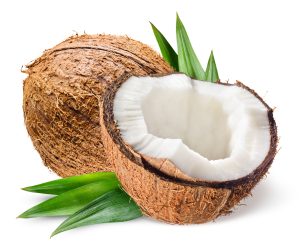 Coconut is an exotic fruit that can be found in many different forms: whole, in pieces, grated, in milk, in water, and even in cream. While people love how it instantly transports them to a tropical location, it also packs plenty of health benefits. Coconut has a high concentration of minerals, fibres, and trace elements that stimulate intestinal transport and give a satiety effect. It is recommended to moderate the consumption of coconut because of its high-fat content.
Coconut is an exotic fruit that can be found in many different forms: whole, in pieces, grated, in milk, in water, and even in cream. While people love how it instantly transports them to a tropical location, it also packs plenty of health benefits. Coconut has a high concentration of minerals, fibres, and trace elements that stimulate intestinal transport and give a satiety effect. It is recommended to moderate the consumption of coconut because of its high-fat content.
- Fig
Benefits: Reduces the risk of cancer
 Figs are an unusual fruit, with a rare symbiotic relationship with the bugs that feast on the tree and use it for shelter. This crunchy, chewy, sickly sweet fruit also happens ot be packing a ton of nutrients. The fig is rich in trace elements but also in minerals such as potassium, copper, and iron, it is also a rich source of B vitamins. All these qualities could reduce the risk of cardiovascular diseases and the instance of cancer.
Figs are an unusual fruit, with a rare symbiotic relationship with the bugs that feast on the tree and use it for shelter. This crunchy, chewy, sickly sweet fruit also happens ot be packing a ton of nutrients. The fig is rich in trace elements but also in minerals such as potassium, copper, and iron, it is also a rich source of B vitamins. All these qualities could reduce the risk of cardiovascular diseases and the instance of cancer.
- Grapefruit
Benefits: Protects against cardiovascular disease
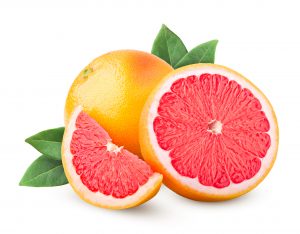 Grapefruit is the unsung hero of the breakfast table. The bitter, ruby red-fleshed fruit might not be everyone’s favorite taste, but it has health properties that’ll have you running to the store to buy those very specifically-shaped grapefruit spoons. Grapefruit is full of very powerful antioxidants which help prevent the onset of cardiovascular diseases. They can also play a role in regulating your blood sugar levels, even contributing to weight loss in people with diabetes, unlike other citrus fruits like oranges which will spike your blood sugar.
Grapefruit is the unsung hero of the breakfast table. The bitter, ruby red-fleshed fruit might not be everyone’s favorite taste, but it has health properties that’ll have you running to the store to buy those very specifically-shaped grapefruit spoons. Grapefruit is full of very powerful antioxidants which help prevent the onset of cardiovascular diseases. They can also play a role in regulating your blood sugar levels, even contributing to weight loss in people with diabetes, unlike other citrus fruits like oranges which will spike your blood sugar.
- Lemons
Benefits: Increases ability to absorb iron
 Lemons are an incredibly versatile fruit–while they are too bitter to be enjoyed alone their bright acidity livens up a wide variety of dishes, from salads to pastas. When you realize how healthy they are, you’ll want to add a splash of lemon to everything you eat. Lemons are a citrus fruit that has a high content of Vitamin C, which is proven to reduce the risk of stroke by regulating the cardiovascular system. Lemons also allow better absorption of iron, an essential element for the body for almost every cellular process.
Lemons are an incredibly versatile fruit–while they are too bitter to be enjoyed alone their bright acidity livens up a wide variety of dishes, from salads to pastas. When you realize how healthy they are, you’ll want to add a splash of lemon to everything you eat. Lemons are a citrus fruit that has a high content of Vitamin C, which is proven to reduce the risk of stroke by regulating the cardiovascular system. Lemons also allow better absorption of iron, an essential element for the body for almost every cellular process.
- Bananas
Benefits: Great source of energy
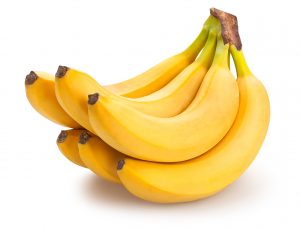 Bananas are one of the first fruits we’re introduced to as children, as they are highly palatable due to their high levels of carbohydrates, mellow sweetness, and subtle flavour. They are also incredibly healthy, in moderation of course. The oblong yellow fruit is not only a great pre-workout snack, but it’s also good for recovery too as its high in potassium–an electrolyte that the body needs to stay hydrated and regulate your heart rate.
Bananas are one of the first fruits we’re introduced to as children, as they are highly palatable due to their high levels of carbohydrates, mellow sweetness, and subtle flavour. They are also incredibly healthy, in moderation of course. The oblong yellow fruit is not only a great pre-workout snack, but it’s also good for recovery too as its high in potassium–an electrolyte that the body needs to stay hydrated and regulate your heart rate.
- Cantaloupe
Benefits: Improves night vision
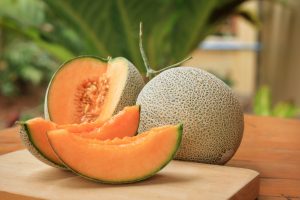 Another great summer fruit is the cantaloupe, which is simply called “melon” in many languages. The fleshy orange fruit is not only a refreshing treat on a hot day, but it also has an impressive nutritional profile too. Cantaloupe is high in Vitamin A, which is a necessary vitamin for the health of our skin and eyes. Diets high in Vitamin A are known to improve night vision, meaning that eating more cantaloupe could mean safer night driving–who knew?
Another great summer fruit is the cantaloupe, which is simply called “melon” in many languages. The fleshy orange fruit is not only a refreshing treat on a hot day, but it also has an impressive nutritional profile too. Cantaloupe is high in Vitamin A, which is a necessary vitamin for the health of our skin and eyes. Diets high in Vitamin A are known to improve night vision, meaning that eating more cantaloupe could mean safer night driving–who knew?
- Lychee
Benefits: Anti-fatigue
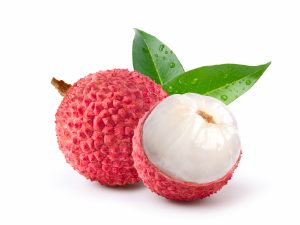 Lychee is a fruit native to China, and it can only be harvested from November to January. The fruit is rarely seen in grocery stores, though once more people find out about its anti-cancer properties this may change. Lychee is full of antioxidants, helping the body flush out problematic mutations that could lead to cancer. It also helps fight fatigue due to its high mineral content, which helps with nearly every bodily function.
Lychee is a fruit native to China, and it can only be harvested from November to January. The fruit is rarely seen in grocery stores, though once more people find out about its anti-cancer properties this may change. Lychee is full of antioxidants, helping the body flush out problematic mutations that could lead to cancer. It also helps fight fatigue due to its high mineral content, which helps with nearly every bodily function.
- Apricots
Benefits: Protects the eyes
 Apricots are most often enjoyed dried in this country, though the fresh ones pack even more health properties. The sweet, fibreful fruit is rich in antioxidants and crucial vitamins like Vitamin A and Vitamin C. Eating them regularly, or loading up on them when they’re in season, can help to reduce or slow down vision loss, due to the high levels of Vitamin A. The high levels of Vitamin C protect your immune system, allowing it to better ward of disease.
Apricots are most often enjoyed dried in this country, though the fresh ones pack even more health properties. The sweet, fibreful fruit is rich in antioxidants and crucial vitamins like Vitamin A and Vitamin C. Eating them regularly, or loading up on them when they’re in season, can help to reduce or slow down vision loss, due to the high levels of Vitamin A. The high levels of Vitamin C protect your immune system, allowing it to better ward of disease.
- Pineapple
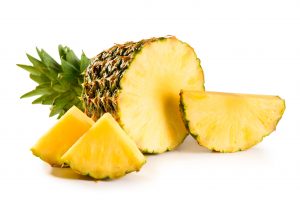 Benefits: Aids digestion, boosts the immune system, eases sweet cravings. Pineapple can be sugary, so you’ll want to consume it in reasonable quantities (no matter how delicious it tastes). Pineapple is loaded with antioxidants, nutrients, and minerals that can aid in digestion, boost your immune system, and keep inflammation at bay. Health line says that pineapple also can help reduce arthritis symptoms and speed recovery after strenuous exercise or even surgery. People struggling with sweet cravings will find they only need a small bit of this juicy fruit to keep their hunger at bay. FYI, it is healthiest to eat pineapple raw, as opposed to eating it from a can where it is soaked in sugary syrup.
Benefits: Aids digestion, boosts the immune system, eases sweet cravings. Pineapple can be sugary, so you’ll want to consume it in reasonable quantities (no matter how delicious it tastes). Pineapple is loaded with antioxidants, nutrients, and minerals that can aid in digestion, boost your immune system, and keep inflammation at bay. Health line says that pineapple also can help reduce arthritis symptoms and speed recovery after strenuous exercise or even surgery. People struggling with sweet cravings will find they only need a small bit of this juicy fruit to keep their hunger at bay. FYI, it is healthiest to eat pineapple raw, as opposed to eating it from a can where it is soaked in sugary syrup.
- Spinach
Benefits: Boosts the immune system
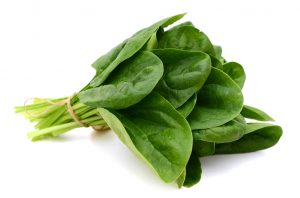 Spinach contains vitamins and minerals like Vitamin E and magnesium that work wonders in supporting your immune system. This system protects you from viruses and bacteria that cause disease, and also defends your body against other things that can harm you, such as toxins and cell mutations. If you are planning to lose weight, it is advisable to add spinach to your diet. Spinach leaves help with weight loss and are also low in calories while being high in fibre, which keeps you full, and keeps you regular.
Spinach contains vitamins and minerals like Vitamin E and magnesium that work wonders in supporting your immune system. This system protects you from viruses and bacteria that cause disease, and also defends your body against other things that can harm you, such as toxins and cell mutations. If you are planning to lose weight, it is advisable to add spinach to your diet. Spinach leaves help with weight loss and are also low in calories while being high in fibre, which keeps you full, and keeps you regular.
- Sweet Potatoes
Benefits: High in vitamins
 You may only eat this vegetable at Thanksgiving, but sweet potatoes are packed with nutrients that make them worth eating year-round. Just one sweet potato gives you 400% of the vitamin A you need every day. Sweet potatoes are also good for your reproductive system and organs like the eyes, heart, and kidneys. The carotenoids in sweet potatoes may even reduce your risk of cancer. Purple sweet potatoes are rich in another natural compound, anthocyanin, which may reduce your risk of getting colorectal cancer specifically.
You may only eat this vegetable at Thanksgiving, but sweet potatoes are packed with nutrients that make them worth eating year-round. Just one sweet potato gives you 400% of the vitamin A you need every day. Sweet potatoes are also good for your reproductive system and organs like the eyes, heart, and kidneys. The carotenoids in sweet potatoes may even reduce your risk of cancer. Purple sweet potatoes are rich in another natural compound, anthocyanin, which may reduce your risk of getting colorectal cancer specifically.
- Cabbage
Benefits: Rich in fibre and antioxidants
 All types of cabbage are high in Vitamin C, a well-known antioxidant. In fact, cabbage comes from the same family as other superfoods like broccoli and cauliflower. It also contains enough fibre to keep you full for hours. Cabbage is also known for its content of sulfurous substances that could prevent certain cancers. While it might not be the star of the produce aisle, the cheap, humble vegetable keeps for a long time in the refrigerator, and is always a good investment.
All types of cabbage are high in Vitamin C, a well-known antioxidant. In fact, cabbage comes from the same family as other superfoods like broccoli and cauliflower. It also contains enough fibre to keep you full for hours. Cabbage is also known for its content of sulfurous substances that could prevent certain cancers. While it might not be the star of the produce aisle, the cheap, humble vegetable keeps for a long time in the refrigerator, and is always a good investment.
- Soybeans
Benefits: High in protein
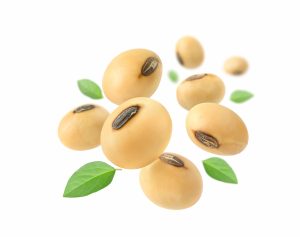 Soybeans are another food that is a staple of any vegetarian or vegan diet due to their high protein content. Not only are they high in protein, but they are one of the few plant sources of complete protein. Most plant sources of protein are lacking in certain amino acids that make the macronutrient usable by your body, but not soybeans. Used to make soymilk, tofu, or left in their natural form like edamame, they are a versatile side or can be the star of the show.
Soybeans are another food that is a staple of any vegetarian or vegan diet due to their high protein content. Not only are they high in protein, but they are one of the few plant sources of complete protein. Most plant sources of protein are lacking in certain amino acids that make the macronutrient usable by your body, but not soybeans. Used to make soymilk, tofu, or left in their natural form like edamame, they are a versatile side or can be the star of the show.
- Mushrooms
Benefits: Protects you against diabetes and cancer
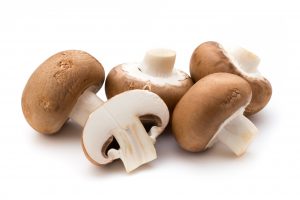 Whether you love them or hate them, mushrooms have unusual health benefits unlike any other of the plant or animal based foods we enjoy, as they are in an entirely different food category–fungus. Among these health properties are something called adaptogens. Adaptogens are thought to be able to be used by your body for whatever it needs, unlike other fixed nutrients that only serve one purpose. Along with being a high source of fibre, adaptogens make mushrooms an invaluable source of nutrition, no matter their cost.
Whether you love them or hate them, mushrooms have unusual health benefits unlike any other of the plant or animal based foods we enjoy, as they are in an entirely different food category–fungus. Among these health properties are something called adaptogens. Adaptogens are thought to be able to be used by your body for whatever it needs, unlike other fixed nutrients that only serve one purpose. Along with being a high source of fibre, adaptogens make mushrooms an invaluable source of nutrition, no matter their cost.
- Watercress
Benefits: Strengthens your immune system and prevents certain cancers
 If you’re that person who wants to throw up when the word “spinach” is mentioned, we may have the solution for you. Watercress is a vegetable that is not often known by everyone even though it is considered to be one of the healthiest food in the world! Watercress is a vegetable rich in calcium, Vitamin C, and iron, and has high levels of antioxidants and minerals. Consuming just 100g of watercress can cover 100% of your daily nutritional needs for so many vital nutrients. That’s why we strongly advise you to take another look the next time you’re in your local produce section.
If you’re that person who wants to throw up when the word “spinach” is mentioned, we may have the solution for you. Watercress is a vegetable that is not often known by everyone even though it is considered to be one of the healthiest food in the world! Watercress is a vegetable rich in calcium, Vitamin C, and iron, and has high levels of antioxidants and minerals. Consuming just 100g of watercress can cover 100% of your daily nutritional needs for so many vital nutrients. That’s why we strongly advise you to take another look the next time you’re in your local produce section.
- Ginger
Benefits: Pain relief, digestion
 Ginger is a food that has been used since ancient times for its various therapeutic properties. It has several health benefits that particularly come in handy when you’re sick: it helps calm nausea, facilitates proper digestion, and can soothe a sore throat. Ginger can also drastically alleviate pain caused by osteoarthritis thanks to its high content of gingerol, shogaol, and zingerone; these elements grant ginger anti-inflammatory and antioxidant functions. So even if its taste might be too intense for some, its health benefits make it well worth choking down some ginger tea every now and then.
Ginger is a food that has been used since ancient times for its various therapeutic properties. It has several health benefits that particularly come in handy when you’re sick: it helps calm nausea, facilitates proper digestion, and can soothe a sore throat. Ginger can also drastically alleviate pain caused by osteoarthritis thanks to its high content of gingerol, shogaol, and zingerone; these elements grant ginger anti-inflammatory and antioxidant functions. So even if its taste might be too intense for some, its health benefits make it well worth choking down some ginger tea every now and then.
- Eggplant/Brinjal
Benefits: Prevents diabetes and improves cardiovascular function
 Eggplants or Brinjal are said to have been cultivated in India several millennia ago, and then in China, where it then spread to the rest of the world. Looking beyond its unique appearance, eggplant has many health benefits. Eggplant contains phytosterol and fiber that can reduce bad cholesterol levels in the blood, and prevent certain cardiovascular diseases, as well as antioxidant properties that reduce the risk of diabetes and cancer.
Eggplants or Brinjal are said to have been cultivated in India several millennia ago, and then in China, where it then spread to the rest of the world. Looking beyond its unique appearance, eggplant has many health benefits. Eggplant contains phytosterol and fiber that can reduce bad cholesterol levels in the blood, and prevent certain cardiovascular diseases, as well as antioxidant properties that reduce the risk of diabetes and cancer.
- Bell Peppers/Capsicum
Benefits: Good for the heart and the eyes
 Bell peppers or capsicums are generally thought of as a vegetable when in fact the bell pepper is technically a fruit. They come in several different colours: red, green, orange, and yellow. Bell peppers have many benefits for the body, including protecting your eyes from light damage. But that’s not all because eating peppers can also reduce your chances of suffering from heart disease thanks to their very rich nutritional value. In addition, depending on the color of the pepper, it will be more or less sweet (red being the sweetest), so there is literally something for everyone!
Bell peppers or capsicums are generally thought of as a vegetable when in fact the bell pepper is technically a fruit. They come in several different colours: red, green, orange, and yellow. Bell peppers have many benefits for the body, including protecting your eyes from light damage. But that’s not all because eating peppers can also reduce your chances of suffering from heart disease thanks to their very rich nutritional value. In addition, depending on the color of the pepper, it will be more or less sweet (red being the sweetest), so there is literally something for everyone!
- Broccoli
Benefits: Promotes good digestion
 Broccoli is a vegetable that has a reputation for being difficult to feed to kids. But the reason that broccoli is important to trick your kids into eating, and important for you to eat at any age as well, is that it’s full of cancer-fighting properties and digestion-aiding fiber. Indeed, the antioxidants present in broccoli protect our body against the risk of inflammation, promote better digestion, and regulate our cholesterol levels. Broccoli also helps the body protect itself against certain types of cancer such as breast, prostate, or bladder cancer.
Broccoli is a vegetable that has a reputation for being difficult to feed to kids. But the reason that broccoli is important to trick your kids into eating, and important for you to eat at any age as well, is that it’s full of cancer-fighting properties and digestion-aiding fiber. Indeed, the antioxidants present in broccoli protect our body against the risk of inflammation, promote better digestion, and regulate our cholesterol levels. Broccoli also helps the body protect itself against certain types of cancer such as breast, prostate, or bladder cancer.
- Asparagus
Benefits: Promotes healthy pregnancies

Asparagus is not often the first vegetable on our shopping list, but it shouldn’t be overlooked as it has many health properties. First of all, asparagus is very low in calories–there are only 20 calories per 100g of asparagus, so it packs a lot of nutrition and filling fiber with little chance at causing weight gain. Asparagus also contains a lot of vitamins (C, E, V, and K) and a high level of antioxidants. The aspect that few people recognise, however, concerns pregnant women: there are high levels of folic acid in asparagus, which contributes to the development of a healthy fetus during any trimester of pregnancy.
- Tomatoes
Benefits: Prevents cancer
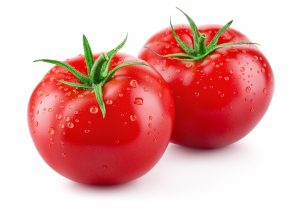 Tomatoes need no introduction–you’ll find them everywhere from inside your healthy salads to on top of your cheat day burger. What many don’t know, however, is that tomatoes are rich in lycopene, the element that gives them their red color and might prevent certain types of cancer. Due to their high levels of Vitamins E and C, they can also work wonders when it comes to skin health and staving off other signs of aging when consumed regularly. Make sure to eat them fresh, and especially when they’re in season in the summer. And don’t think that eating ketchup will cut it.
Tomatoes need no introduction–you’ll find them everywhere from inside your healthy salads to on top of your cheat day burger. What many don’t know, however, is that tomatoes are rich in lycopene, the element that gives them their red color and might prevent certain types of cancer. Due to their high levels of Vitamins E and C, they can also work wonders when it comes to skin health and staving off other signs of aging when consumed regularly. Make sure to eat them fresh, and especially when they’re in season in the summer. And don’t think that eating ketchup will cut it.
- Carrots
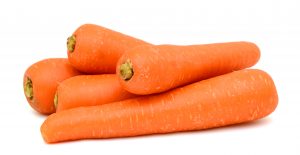 Benefits: Increases strength and growth of hair and nails. Carrots are a vegetable that contains what is called beta carotene, a pigment that brings a lot of benefits to your body–or can even turn your skin orange if you happen to eat carrots at every single meal for a couple of months. This antioxidant can slow down the aging of our cells and even improve the quality of our skin due to its high Vitamin A content. Carrots also contain a specific type of Vitamin B that promotes hair and nail growth, making it one of nature’s best beauty products.
Benefits: Increases strength and growth of hair and nails. Carrots are a vegetable that contains what is called beta carotene, a pigment that brings a lot of benefits to your body–or can even turn your skin orange if you happen to eat carrots at every single meal for a couple of months. This antioxidant can slow down the aging of our cells and even improve the quality of our skin due to its high Vitamin A content. Carrots also contain a specific type of Vitamin B that promotes hair and nail growth, making it one of nature’s best beauty products.
- Artichokes
Benefits: Helps relieve constipation
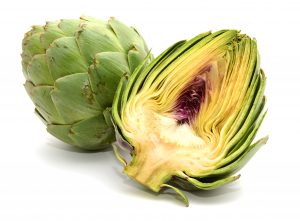 Artichokes might seem like an intimidating food to cook or eat if you’ve never tried them before. If you’re willing to take a chance on the spiky green vegetable, your body will surely thank you. Artichokes are high in antioxidants which fight cardiovascular disease, and so much more. In addition, artichokes are an incredible source of dietary fiber. If you roast your artichokes with olive oil and salt and get to work scraping the bits of flesh off of the leaves, you’ll be rewarded with a happy digestive system.
Artichokes might seem like an intimidating food to cook or eat if you’ve never tried them before. If you’re willing to take a chance on the spiky green vegetable, your body will surely thank you. Artichokes are high in antioxidants which fight cardiovascular disease, and so much more. In addition, artichokes are an incredible source of dietary fiber. If you roast your artichokes with olive oil and salt and get to work scraping the bits of flesh off of the leaves, you’ll be rewarded with a happy digestive system.
- Celery
Benefits: Helps with digestion and constipation, provides blood sugar management
 Celery is a low-calorie food with a lot of benefits. For one, BBC Good Food says that it can support heart health, blood sugar management, and memory. It is also anti-inflammatory and can make for easy digestion. Celery only has fourteen calories per cup, so it is a low-calorie, crunchy snack that won’t expand your waistline. In addition to the benefits above, celery also contains beta carotene, Vitamin C, and a dozen additional antioxidants—all in one single stalk. Lastly, celery is rich in fiber, so if you are struggling with constipation, try reaching for the celery before the over-the-counter medication.
Celery is a low-calorie food with a lot of benefits. For one, BBC Good Food says that it can support heart health, blood sugar management, and memory. It is also anti-inflammatory and can make for easy digestion. Celery only has fourteen calories per cup, so it is a low-calorie, crunchy snack that won’t expand your waistline. In addition to the benefits above, celery also contains beta carotene, Vitamin C, and a dozen additional antioxidants—all in one single stalk. Lastly, celery is rich in fiber, so if you are struggling with constipation, try reaching for the celery before the over-the-counter medication.
- Red Cabbage
Benefits: Packed with nutrients
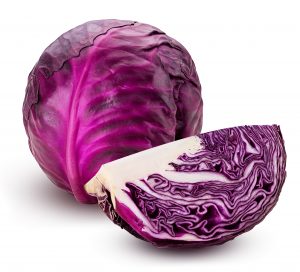 With a very cheap price, fresh cabbage is one of those foods that can be easily incorporated into everyone’s diet. The vegetable has an impressive nutrient profile, and it is known to help calm down inflammation and improve digestion. Cabbage is packed with vitamin C which plays an important role in bodily functions. Apart from this, red cabbage contains anthocyanins which give the vegetable its vibrant purple color. Numerous studies have shown that foods rich in this pigment can reduce the risk of heart disease, which is why cabbage is also good for the heart.
With a very cheap price, fresh cabbage is one of those foods that can be easily incorporated into everyone’s diet. The vegetable has an impressive nutrient profile, and it is known to help calm down inflammation and improve digestion. Cabbage is packed with vitamin C which plays an important role in bodily functions. Apart from this, red cabbage contains anthocyanins which give the vegetable its vibrant purple color. Numerous studies have shown that foods rich in this pigment can reduce the risk of heart disease, which is why cabbage is also good for the heart.
- Turmeric
Benefits: Anti-inflammatory and antioxidant properties
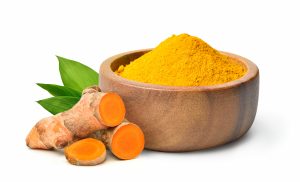 Turmeric is one of the most essential spices in Indian cuisine. Lately, it has also become quite popular in America for its anti-inflammatory and antioxidant properties. This spice is easily found in supermarkets and even online. Not only can versatile turmeric lend itself to many different recipes, but it’s also one of the more affordable spices in the spice aisle. Ironically, although it is an anti-inflammatory, turmeric can cause bloating if consumed in large quantities. If you are considering including it in your diet, be sure to consume it in moderation!
Turmeric is one of the most essential spices in Indian cuisine. Lately, it has also become quite popular in America for its anti-inflammatory and antioxidant properties. This spice is easily found in supermarkets and even online. Not only can versatile turmeric lend itself to many different recipes, but it’s also one of the more affordable spices in the spice aisle. Ironically, although it is an anti-inflammatory, turmeric can cause bloating if consumed in large quantities. If you are considering including it in your diet, be sure to consume it in moderation!
- Dark Chocolate
Benefits: Heart health, anti-aging
 When the cocoa content exceeds 70%, chocolate becomes a health food rather than a dessert. First of all, cocoa powder is extremely rich in antioxidants and helps our body fight against cell aging and inflammation. In addition, dark chocolate is highly involved in covering our daily needs in potassium, an electrolyte important for kidney function. Dark chocolate is also considered good for the heart, as it has a protective and preventive effect against cardiovascular diseases. According to studies, this is due to the presence of flavonoids that have an anti-inflammatory effect and have the ability to improve sensitivity to insulin or prevent the formation of blood clots. Studies also show that cocoa flavonoids would also help to improve the elasticity of blood vessels and thus reduce blood pressure.
When the cocoa content exceeds 70%, chocolate becomes a health food rather than a dessert. First of all, cocoa powder is extremely rich in antioxidants and helps our body fight against cell aging and inflammation. In addition, dark chocolate is highly involved in covering our daily needs in potassium, an electrolyte important for kidney function. Dark chocolate is also considered good for the heart, as it has a protective and preventive effect against cardiovascular diseases. According to studies, this is due to the presence of flavonoids that have an anti-inflammatory effect and have the ability to improve sensitivity to insulin or prevent the formation of blood clots. Studies also show that cocoa flavonoids would also help to improve the elasticity of blood vessels and thus reduce blood pressure.
- Yogurt
 Benefits: High level of good bacteria
Benefits: High level of good bacteria
Eating yogurt is good for your health because it’s chock full of good bacteria. These bacteria have the power to aid in proper digestion. In addition, yogurt is high in calcium and other nutrients that strengthen your bones.
- Walnuts
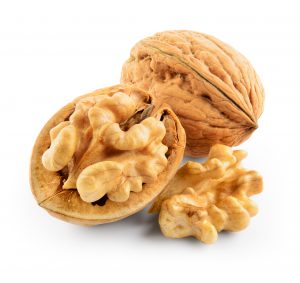 Walnuts are a great food to help you kick sugar cravings throughout the day. Just a handful can help you stay on track with your diet, helping fight anxiety while promoting the feeling of satiety. Walnuts also have healthy oils that boost your brainpower, enhancing cognitive function like working memory. So next time you’re thinking of making another coffee run for an expensive latte as a pick me up, reach for the nuts instead.
Walnuts are a great food to help you kick sugar cravings throughout the day. Just a handful can help you stay on track with your diet, helping fight anxiety while promoting the feeling of satiety. Walnuts also have healthy oils that boost your brainpower, enhancing cognitive function like working memory. So next time you’re thinking of making another coffee run for an expensive latte as a pick me up, reach for the nuts instead.
- Garlic
Benefits: Helps detoxify the body
 This small, but very effective pod is the most protective member of the allium family along with onions, shallots, leeks, and chives. Its sulfur compounds activate the detoxification of the body, preventing the formation of nitrosamines (found in the nitrites of deli meats) likely to cause a DNA mutation, thus a risk of cancer. In the prevention of cancers of the esophagus, stomach, prostate, colon, eat garlic at a rate of ten pods per week, fresh or crushed and cooked. Just remember to stock up on breathmints, as you’re friends are sure to catch a whiff of your breath from a mile away.
This small, but very effective pod is the most protective member of the allium family along with onions, shallots, leeks, and chives. Its sulfur compounds activate the detoxification of the body, preventing the formation of nitrosamines (found in the nitrites of deli meats) likely to cause a DNA mutation, thus a risk of cancer. In the prevention of cancers of the esophagus, stomach, prostate, colon, eat garlic at a rate of ten pods per week, fresh or crushed and cooked. Just remember to stock up on breathmints, as you’re friends are sure to catch a whiff of your breath from a mile away.
- Brown Rice
Benefits: Has fiber and magnesium, reduces risk of heart disease
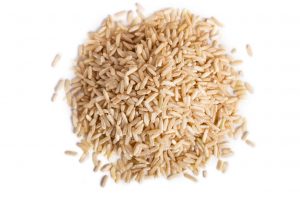 WebMD says that a lot of the nutrients found in brown rice can help your heart-health. Brown rice is far superior to white rice, which spikes your blood sugar and leaves you feeling hungry sooner. Brown rice has a lot of fiber, which can reduce your risk of heart disease. Brown rice also has a lot of magnesium, which, much like fiber, makes you less vulnerable to heart disease. If you want rice to be a regular part of your diet, brown rice will make that choice healthier than picking white, as long as you eat it as part of a well-balanced diet.
WebMD says that a lot of the nutrients found in brown rice can help your heart-health. Brown rice is far superior to white rice, which spikes your blood sugar and leaves you feeling hungry sooner. Brown rice has a lot of fiber, which can reduce your risk of heart disease. Brown rice also has a lot of magnesium, which, much like fiber, makes you less vulnerable to heart disease. If you want rice to be a regular part of your diet, brown rice will make that choice healthier than picking white, as long as you eat it as part of a well-balanced diet.
- Beans & Dal
Benefits: Can improve digestion and bone health, can reduce bad cholesterol
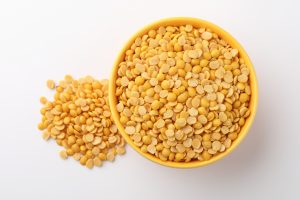 Tarka Dal, also known as Dal Tadka or Dal Fry, is an Indian dish made from split chickpeas and a blend of savory spices. The spices are infused with oil, and the oil is drizzled over the “Dal” chickpeas. This flavorful, tasty dish has a lot of fiber, especially raffinose, a soluble fiber. Chickpeas can help with digestion, and they also can help with bone strength, as they have fiber, magnesium, calcium, and other bone-related nutrients. According to Science Daily, chickpeas can help reduce bad cholesterol, and, therefore, your risk of cardiovascular disease. One cup is considered one serving of chickpeas.
Tarka Dal, also known as Dal Tadka or Dal Fry, is an Indian dish made from split chickpeas and a blend of savory spices. The spices are infused with oil, and the oil is drizzled over the “Dal” chickpeas. This flavorful, tasty dish has a lot of fiber, especially raffinose, a soluble fiber. Chickpeas can help with digestion, and they also can help with bone strength, as they have fiber, magnesium, calcium, and other bone-related nutrients. According to Science Daily, chickpeas can help reduce bad cholesterol, and, therefore, your risk of cardiovascular disease. One cup is considered one serving of chickpeas.
- Chicken breast
Benefits: High protein content
 Chicken is one of the most popular types of meat, eaten all over the world in a wide variety of dishes. Not only is it widely available at grocery stores and butcher shops, but it’s also really healthy and high in protein. The healthiest cut of chicken is the breast meat, which has the highest ratio of protein to fat. And while the skin gets a bad rap as being fatty, it’s actually high in collagen which helps fight skin aging from the inside out, while contributing to the muscle growth you get from eating a high protein diet and hitting the gym.
Chicken is one of the most popular types of meat, eaten all over the world in a wide variety of dishes. Not only is it widely available at grocery stores and butcher shops, but it’s also really healthy and high in protein. The healthiest cut of chicken is the breast meat, which has the highest ratio of protein to fat. And while the skin gets a bad rap as being fatty, it’s actually high in collagen which helps fight skin aging from the inside out, while contributing to the muscle growth you get from eating a high protein diet and hitting the gym.
- Eggs
Benefits: Promotes better concentration and memory
 Following an anti-cholesterol smear campaign, popular wisdom for years was to avoid eggs to keep your bad cholesterol levels in check. After more scientific inquiry, it has been proven that eating more eggs does not necessarily correlate with higher cholesterol levels in the body. Eggs do, however, contain myriad nutritional properties that make them an excellent part of any balanced diet. Make sure to eat the yolk, not just the whites, to take full advantage of their nutritional value, as the yolk has the most density of vitamins like vitamin B, which helps with brain function.
Following an anti-cholesterol smear campaign, popular wisdom for years was to avoid eggs to keep your bad cholesterol levels in check. After more scientific inquiry, it has been proven that eating more eggs does not necessarily correlate with higher cholesterol levels in the body. Eggs do, however, contain myriad nutritional properties that make them an excellent part of any balanced diet. Make sure to eat the yolk, not just the whites, to take full advantage of their nutritional value, as the yolk has the most density of vitamins like vitamin B, which helps with brain function.
- Shrimp
Benefits: Maintains muscle mass
 While seafood isn’t exactly everyone’s favorite kind of food–head-on shrimp do kind of look like undersea insects–most kinds of seafood pack an impressive nutritional value unmatched by any edible critters on land. Shrimp specifically are very high in protein and very low in calories, making them an excellent way to build or maintain lean muscle. Diets higher in shrimp versus other forms of meat are shown to reduce the risk of cardiovascular disease.
While seafood isn’t exactly everyone’s favorite kind of food–head-on shrimp do kind of look like undersea insects–most kinds of seafood pack an impressive nutritional value unmatched by any edible critters on land. Shrimp specifically are very high in protein and very low in calories, making them an excellent way to build or maintain lean muscle. Diets higher in shrimp versus other forms of meat are shown to reduce the risk of cardiovascular disease.
In conclusion, the old saying, “You are what you eat,” holds more truth than we often realize. The evidence is clear: eating healthy food is essential for your longevity. The choices we make when it comes to our diet have a profound impact on our overall health and how long we can enjoy a high quality of life. By prioritizing nutritious, balanced meals that are rich in fruits, vegetables, whole grains, lean proteins, and healthy fats, we empower ourselves to prevent and manage chronic diseases, maintain a healthy weight, and boost our immune system. These dietary choices not only contribute to a longer life but also improve our overall well-being, providing us with the energy and vitality to make the most of the years we have. So, remember, the path to a longer, healthier life begins on your plate. Choose wisely, eat well, and invest in a future filled with vitality, happiness, and the priceless gift of longevity.




